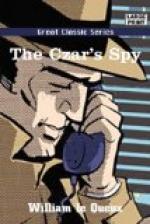Her very words seemed an admission that she was aware of the identity of the conspirators, and yet she would give me no clue to them.
We went out and up the drive together to the kennels, where her father, a tall, imposing figure in his shooting-kit, was giving orders to the keepers.
“Hulloa, Gregg!” he cried merrily, extending his hand. “You’ll make one of a party to Glenlea to-morrow, won’t you? Paton and Phillips are coming. Ten sharp here, and the ladies are coming out to lunch with us.”
“Thanks,” I said, accepting with pleasure, for by so doing I saw that I might be afforded an opportunity of being near Muriel. The fact that the assassins were aware of our knowledge seemed to have caused her the greatest apprehension lest evil should befall us. Then, as we turned away to go back to the house, Leithcourt said to me—
“You know all about the discovery up at the wood the other day! Horrible affair—a young foreigner found murdered.”
“Yes. I’ve heard about it,” I responded.
“And the police are worse than useless,” he declared with disgust. “They haven’t discovered who the fellow is yet. Why, if it had happened anywhere else but in Scotland, they’d have arrested the assassin before this.”
“He’s an entire stranger, I hear,” I remarked. And then added: “You often go up to the wood of an evening after pigeons. It’s fortunate you were not there that evening, eh?”
He glanced at me quickly with his brows slightly contracted, as though he did not exactly comprehend me. In an instant I saw that my remark had caused him quick apprehension.
“Yes,” he answered with a sickly smile which he intended should convey to me utter unconcern. “They might have suspected me.”
“It certainly is a disagreeable affair to happen on one’s property.” I said, still watching him narrowly. And then Muriel at his side managed with her feminine ingenuity to divert the conversation into a different channel.
Next day I accompanied the party over to Glenlea, about five miles distant, and at noon at a spot previously arranged, we found the ladies awaiting us with luncheon spread under the trees. As soon as we approached Muriel came forward quickly, handing me a telegram, saying that it had been sent over by one of my uncle’s grooms at the moment they were leaving the castle.
I tore it open eagerly, and read its contents. Then, turning to my companions, said in as quiet a voice as I could command—
“I must go up to London to-night,” whereat the men, one and all, expressed hope that I should soon return. Leithcourt’s party were a friendly set, and at heart I was sorry to leave Scotland. Yet the telegram made it imperative, for it was from Frank Hutcheson in Leghorn, and read—
"Made inquiries. Olinto Santini married your servant Armida at Italian Consulate-General in London about a year ago. They live 64B, Albany Road, Camberwell: he is employed waiter Ferrari’s Restaurant, Westbourne Grove.—British Consulate, Leghorn"




